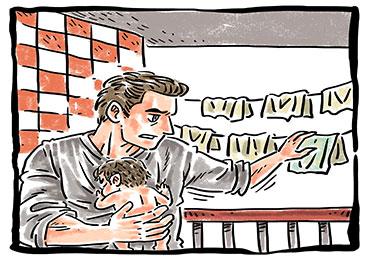he first time I heard the term “filial piety,” I had to look both words up in the dictionary. This concept is not exactly foreign in the West. For example, one of the Ten Commandments is “honor thy mother and father.” That being said, according to one survey, more Americans can name all the ingredients in a Big Mac than name all Ten Commandments.
Unlike the Ten Commandments, the ancient text “24 Exemplars of Filial Piety” contains examples of good behavior of a type familiar to many Chinese today.
My favorite involves 8-year-old Wu Meng, whose family was so poor it could not afford a mosquito net. In the summer, the little boy took off his clothes and let the mosquitos feed on his naked body so the pests would not bother his parents.
Lest you think this parable has no bearing on modern times, consider the plight of an unmarried Chinese daughter returning home from university or work for the Spring Festival holiday, a duty of all Chinese.
Instead of mosquito bites, the young women must bear being asked dozens or even scores of times, “When will you get married?” She must bear the questions with equanimity, even when asked several times over the same meal, just like little Wu and the mosquito bites.
Other classical examples of filial piety include a woman breastfeeding her toothless mother-in-law, and a man preparing to kill his toddler so there would be more food in the cupboard for his mother.
Contemporary examples include doing a job you hate to make your parents proud and letting your parents stay with you indefinitely with no notice.
When Canadian parents visit their kids, it is most likely for a day, or in rare cases, a week.
In contrast, when Chinese parents visit, it is often for an indeterminate amount of time, measured in months.
For the married adult child, this has pros and cons. The main pros are that Chinese parents tend to be extremely helpful around the house and make efforts to make life easier for their children.
The cons are that all progress you thought you had made toward becoming a secure adult is proved to be an illusion as everyone falls back into old familiar patterns.
In addition, if you have children, any hopes you may have harbored about using modern child-rearing methods must be suspended until the grandparents leave.
In the case of our family, the old ways are valued to the point that even baby wipes are set aside in favor of a butt wash in a basin of water followed by a good wipe with a cloth that is hand-washed in the sink and hung to dry in the living room in front of the television. Why aren’t the poopy cloths washed in our washing machine? Well, in that case you might as well just use baby wipes!
Filial piety is a very old concept, and one of its main obligations is that a child must take care of his (yes, his) parents in their old age. This concept is still emphasized in modern China, and there are even laws on the books to enforce it. Chinese public figures make great efforts to show their filial piety toward their parents, in the same way their Western counterparts might highlight their philanthropic efforts.
In fact, a common pressure tactic the older generation uses on their children to speed up the arrival of grandchildren is to say, “Who will take care of you when you are old?”
In the past, when China was a much poorer place, elderly people often truly did rely on their kids to feed and house them.
But China has become a wealthy society, and in a reversal, parents are now frequently able to help their children out financially.
For example, I lived in a beautiful rural village populated by farmers who still tilled small plots of land by hand. Their young daughter drove a beautiful new German sedan. I asked how she could afford it, and discovered her farmer parents gave it to her as a wedding gift.
In contrast to the “24 Exemplars of Filial Piety,” modern Chinese parents generally do and sacrifice anything for the sake of their children.
For their kids’ education, no expense is too great, and no sacrifice is too great.
Living up to these expectations can be exhausting, and perhaps even soul crushing, but there is never any doubt of a strong bond tying together most Chinese families.
I’ve often wondered, especially during periodic quarrels with my wife, why the concept of filial piety remains so strong in Chinese families, whereas the Confucian concept that a virtuous woman obeys her husband after marriage seems to have ended up in the dustbin of history. But that, I suppose, is a matter for another column.

 Old Version
Old Version